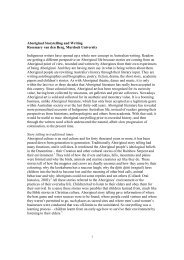Gallipoli, Kokoda and the Making of National Identity - [API] Network
Gallipoli, Kokoda and the Making of National Identity - [API] Network
Gallipoli, Kokoda and the Making of National Identity - [API] Network
Create successful ePaper yourself
Turn your PDF publications into a flip-book with our unique Google optimized e-Paper software.
The <strong>Making</strong> <strong>of</strong> <strong>National</strong> <strong>Identity</strong><br />
lights <strong>and</strong> sirens flashed <strong>and</strong> wailed; on VP day Ben Chifley’s gravelly voice again<br />
proclaimed <strong>the</strong> end <strong>of</strong> <strong>the</strong> war; <strong>and</strong> 100,000 marched in ticker-tape in Sydney <strong>and</strong><br />
Melbourne. Sydney’s dancing man who d<strong>of</strong>fed his hat to <strong>the</strong> camera on 15 August<br />
1945 (<strong>and</strong> has been doing it on screen ever since) was <strong>of</strong>ficially recognised as Ern<br />
Hill <strong>and</strong> he joined <strong>the</strong> prime minister to watch <strong>the</strong> 1995 parade from <strong>the</strong> town hall<br />
steps. 10 In 1995 every electorate had $20,000 to spend on recalling <strong>the</strong> war, 400 exservice<br />
units had government subsidised reunions, every school received an education<br />
kit, <strong>and</strong> <strong>the</strong> minister for veterans affairs, Con Sciacca, attended an extraordinary<br />
number <strong>of</strong> <strong>the</strong> 4000 <strong>of</strong>ficially recognised Australia remembers events. 11 There was<br />
a deliberate attempt to embrace all Australians who might have been overlooked in<br />
<strong>the</strong> previous fifty years: <strong>the</strong> Chinese volunteer ambulancemen <strong>of</strong> Rabaul, Torres<br />
Strait Isl<strong>and</strong>ers <strong>and</strong> Aborigines who served, <strong>the</strong> Tatura civilian internees, <strong>the</strong> merchant<br />
seamen, ammunition workers <strong>and</strong> women’s units such as <strong>the</strong> women’s l<strong>and</strong> army.<br />
The second world war was remembered with a much greater intensity <strong>and</strong> broader<br />
popularity in Australia than in Papua New Guinea where <strong>the</strong> impact <strong>of</strong> war was so<br />
much greater, or Indonesia where <strong>the</strong> nation was born out <strong>of</strong> <strong>the</strong> war, or Singapore,<br />
or Malaysia or anywhere in <strong>the</strong> region. Only D-Day, international on 6 June 1944<br />
<strong>and</strong> international in its recreation, surpassed in scale any Australian commemoration.<br />
For sustained communal recollection Australia was supreme.<br />
Through <strong>the</strong> fiftieth anniversaries <strong>the</strong> prime minister <strong>and</strong> o<strong>the</strong>rs took a consistent<br />
line, attempting to shift <strong>the</strong> emphasis in Australian history <strong>and</strong> identity from <strong>the</strong> first<br />
world war to <strong>the</strong> second. They certainly did not say that <strong>the</strong>y wanted to reduce <strong>the</strong><br />
importance <strong>of</strong> <strong>the</strong> first world war but <strong>the</strong>re was an insistence on moving on, on<br />
transferring attention from <strong>Gallipoli</strong> to <strong>Kokoda</strong>. Why were <strong>the</strong>y doing this?<br />
They did not want Australian nationhood defined when Australia was acting as a<br />
junior partner in a distant war, when Australians were so clearly part <strong>of</strong> <strong>the</strong> British<br />
empire forces, <strong>the</strong>y wanted to bring <strong>the</strong> symbols <strong>of</strong> nationhood closer to <strong>the</strong> nation<br />
<strong>and</strong> <strong>the</strong>y wanted <strong>the</strong> determining events in <strong>the</strong> history <strong>of</strong> <strong>the</strong> nation to be decided by<br />
Australians acting in specifically Australian interests. All <strong>of</strong> this was consistent<br />
with bringing <strong>the</strong> unknown Australian home, severing ties with <strong>the</strong> British monarchy<br />
<strong>and</strong> o<strong>the</strong>r ‘symbolic vestiges’, streng<strong>the</strong>ning economic, diplomatic, educational <strong>and</strong><br />
defence ties with <strong>the</strong> Asia-Pacific, <strong>and</strong> never trying to be “‘Asian” or European or<br />
anything else but Australians’. 12 The Australia <strong>the</strong>y spoke <strong>of</strong> was an ‘egalitarian,<br />
multicultural <strong>and</strong> humane democracy ... deeply integrated in <strong>the</strong> region’. 13<br />
Can <strong>Kokoda</strong> support <strong>the</strong> weight <strong>of</strong> national significance being imposed on it?<br />
<strong>Kokoda</strong> has two major deficiencies <strong>and</strong> ei<strong>the</strong>r may be sufficient to exclude it from<br />
being <strong>the</strong> confirming point <strong>of</strong> <strong>the</strong> ‘depth <strong>and</strong> soul <strong>of</strong> <strong>the</strong> nation’. It was a ruthless<br />
battle, fought in appalling physical conditions <strong>and</strong> <strong>the</strong> enemy was arrogant <strong>and</strong><br />
triumphant early, starving, desperate <strong>and</strong> dying in thous<strong>and</strong>s at <strong>the</strong> end but hated<br />
throughout. Many Australians will not want to see national identity defined in <strong>the</strong><br />
violence <strong>of</strong> <strong>Kokoda</strong>. And for Australians <strong>Kokoda</strong> was exclusively male. Yet if<br />
Australians are determined to see <strong>the</strong>mselves made in battle is it appropriate to<br />
move forward from <strong>Gallipoli</strong> to <strong>Kokoda</strong>?<br />
<strong>Kokoda</strong> was certainly in our region. It was on Australian territory, <strong>and</strong> a territory<br />
that some Australians <strong>the</strong>n thought might one day be an Australian state. It was<br />
one <strong>of</strong> those rare battles fought by Australia in which Australians were responsible<br />
153


![Gallipoli, Kokoda and the Making of National Identity - [API] Network](https://img.yumpu.com/31766380/6/500x640/gallipoli-kokoda-and-the-making-of-national-identity-api-network.jpg)
![Dream and Nightmare in William Gibson's ... - [API] Network](https://img.yumpu.com/49298598/1/184x260/dream-and-nightmare-in-william-gibsons-api-network.jpg?quality=85)

!['Fuck All Editors': The Ern Malley Affair and Gwen ... - [API] Network](https://img.yumpu.com/42446228/1/184x260/fuck-all-editors-the-ern-malley-affair-and-gwen-api-network.jpg?quality=85)
![Polona Petek - [API] Network](https://img.yumpu.com/40542952/1/190x245/polona-petek-api-network.jpg?quality=85)
![to download as a PDF. - [API] Network](https://img.yumpu.com/35170825/1/184x260/to-download-as-a-pdf-api-network.jpg?quality=85)
![Edward Koiki Mabo: The Journey to Native Title - [API] Network](https://img.yumpu.com/33197148/1/184x260/edward-koiki-mabo-the-journey-to-native-title-api-network.jpg?quality=85)
![Indigenous Knowledge and Pharmaceuticals - [API] Network](https://img.yumpu.com/24108846/1/184x260/indigenous-knowledge-and-pharmaceuticals-api-network.jpg?quality=85)
![Ferals: Terra-ism and Radical Ecologism in Australia - [API] Network](https://img.yumpu.com/13809010/1/184x260/ferals-terra-ism-and-radical-ecologism-in-australia-api-network.jpg?quality=85)
![Big Chief Little Wolf: Wrestling, Radio and Folklore in ... - [API] Network](https://img.yumpu.com/12204748/1/184x260/big-chief-little-wolf-wrestling-radio-and-folklore-in-api-network.jpg?quality=85)
![Dark Tourism and the Celebrity Prisoner - [API] Network](https://img.yumpu.com/4348795/1/184x260/dark-tourism-and-the-celebrity-prisoner-api-network.jpg?quality=85)